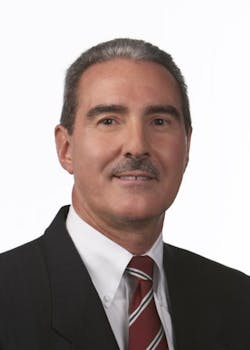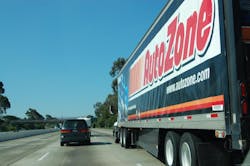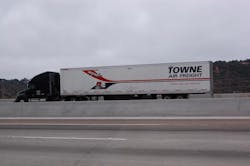Despite those drawbacks, though, there’s a growing feeling in the U.S. workforce today that trucking might just be able to use to its advantage where the driver shortage is concerned: “restlessness.”
Take this recent University of Phoenix survey, for starters: it found that more than half (55%) of working adults are interested in changing careers today, with nearly a quarter (24%) extremely or very interested in a career change.
Why is that? Well one reason may be, according to the university’s poll (conducted online with more than 1,600 U.S. employed adults by Harris Interactive back in April), that only 14% of American workers say they are in their “dream careers” and thus are restless to make a change.
“It is not uncommon for working adults to consider one or multiple career changes,” noted Bill Pepicello (above at right), president of the University of Phoenix. “Choosing one career path after high school or college and sticking with it for the rest of a career is becoming less common as the pace of business and technology quickly alters jobs and industries. We see many working adults coming back to school 10 to 20 years after they started their careers to prepare for a new career or find new growth opportunities in their current industry.”
Not surprisingly, though, driving a truck isn’t high on the radar for most such “restless” workers, as the most desired careers – according to the university’s poll – are in arts and sciences (17%), business management (16%) and technology (14%).
[That last one – technology – is something as a surprise, though, as another survey recently found fewer graduates are leaving college with IT-focused degrees. That’s a strange contradiction to say the least!]
Rounding out the most desired fields are: healthcare (12%), education and psychology/social sciences even at 11%, followed by criminal justice and security (10%), skilled trades (8%) and the military (3%).Although 78% of younger workers in their 20s are interested in changing careers, they are not the only ones. In fact, 64% of working adults in their 30s are interested in changing careers, followed by 54% in their 40s, and 51% in their 50s – dropping below the 50% mark on for those who are 60 years or older (only 26% of them want to change jobs).
Even in upper levels of management, there is a considerable desire to change careers, as 43% of C-level executives are at least somewhat interested in changing careers, with more than a quarter (26%) very or extremely interested.
Another interesting point gleaned from this survey: Where workers live can have a considerable effect on their interest in changing careers.
For example, working adults in San Francisco are much less likely than workers across the nation to want to change careers, with 60% saying they are not at all interested in changing careers, compared to the national average of 45%. By contrast, New Yorkers are more interested in change than most Americans, with 33% of working adults in New York City reporting they are very or extremely interested in career change, compared to the national average of 24%.
Overall, the city with the biggest pot of workers at least somewhat interested in changing careers (including those “extremely interested” hot-to-trot folks) is Atlanta (67%), followed New York City (62%), Los Angeles (60%), Chicago (55%) and Dallas-Ft. Worth (52%).The university’s survey also found that workers in small and very large companies are less likely to want to change careers than those working in mid-size companies, with more than half (52%) of workers in companies with less than 100 employees are not at all interested in changing careers, compared to 38% in companies with between 100 and 10,000 workers and 42% with 10,000 or more employees.
Here’s another interesting factoid: 90% of working adults report that they had career plans when they were younger, but nearly three-quarters (73%) say that they are not currently in the career they had planned when they were younger, while only 27% say they are in that career. Among those who had career plans when they were younger, women (77%) are significantly more likely than men (68%) to report that they are not currently in the career they had planned.
Yet – unsurprising perhaps – among those working adults who are interested in changing careers, 95% identify barriers that are preventing them from doing so, with more than half (57%) citing a lack of financial security, while 40% remain uncertain about what other career to change to and 37% identify a lack of adequate education or experience.
Nearly one-third (32%) fear the unknown and 31% consider themselves to be too advanced in age or in their current position to change careers now, the university’s poll found, with 43% of those without a bachelor’s degree identify lack of adequate education/experience as a barrier, which is significantly higher than those with a bachelor’s degree or more (26%).
“There is a skills gap in America, which has contributed to more than three million open positions,” said Pepicello. “There are definitely opportunities, and professionals who have done their homework will have an advantage. It is important that those looking to change careers understand where the jobs are, the necessary skills, how experience from previous employment will translate to a new industry and the skills they still need to grow.”
Can trucking take advantage of this “restlessness” then? There are driver jobs aplenty, of course, but can they be made attractive to folks looking for a new career? That will be the real trick.






